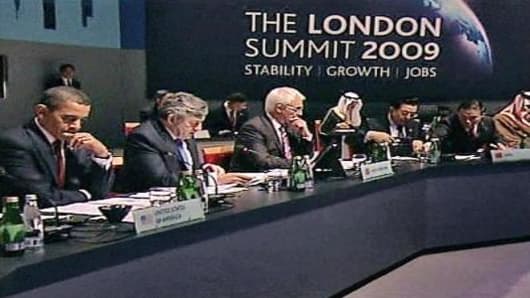It is an extraordinary number for extraordinary times: $1.1 trillion in aid, to be pumped into the world’s financial bloodstream. For the leaders gathered in London last week, it was tangible evidence that their economic summit meeting had yielded impressive results.
Yet on closer inspection, the $1 trillion figure looks as wishful as the soaring words in the communiqué issued by the Group of 20. Some of the money has yet to be pledged, some is double-counted and some would be counted in a “synthetic currency” that is not actually real money.
Given that the global economic recession is at least partly a crisis of confidence, experts said there was value in announcing a blockbuster sum — even a notional one. Investors were buoyed, and the news media printed and broadcast the headline number without stopping to parse it.
But some experts warn that the squishy mathematics could come back to haunt the leaders, particularly if the economy does not recover or if some of the major pledges do not come through.
“The lack of concreteness in the numbers is troubling, because further down the line, they’re going to have to come to grips with the details,” said Eswar S. Prasad, a former China division chief at the International Monetary Fund who now teaches at Cornell University.
About $500 billion of the $1 trillion represents increased direct financing for the International Monetary Fund. But, by Mr. Prasad’s count, less than half of that has so far been committed by Japan, the European Union, Canada and Norway. China is expected to kick in $40 billion, which it may do by buying bonds issued by the fund.
Treasury Secretary Timothy F. Geithner has committed the United States to $100 billion. But that must be authorized by Congress, which, administration officials acknowledge, is skeptical of foreign aid and may be doubly so this time, given its heavy spending on domestic stimulus.
Even counting the United States, Mr. Prasad said that left a shortfall of $145 billion of the $500 billion in donations. Among potential donors are Saudi Arabia and other Persian Gulf states and emerging markets like India. Their willingness to pay, however, will hinge on getting a bigger voice in the fund’s affairs.
To “kick start” flagging world trade, in the words of Prime Minister Gordon Brown of Britain, the leaders agreed to commit $250 billion in trade credit over two years, on top of $100 billion in loans from multilateral development banks, which lend to poorer countries.
“Together,” Mr. Brown said, “these actions give us confidence that the global economy can return to trend growth even faster than the International Monetary Fund is now predicting.”
But of that $250 billion, experts said, only a quarter represents fresh cash: trade financing is rolled over every six months as exporters get paid for their goods and repay the agencies that lent them the money. The agencies then lend out the same money again. There is also some double-counting between the $250 billion and the $100 billion from the development banks.
In perhaps the most novel move, the Group of 20 authorized the monetary fund to issue $250 billion in Special Drawing Rights, known as SDR’s — a “virtual currency” whose value is set by a basket of real currencies like the dollar, euro and British pound. The IMF will issue the SDR’s to all 185 of its members, and they in turn can lend them out to poor countries.
Special Drawing Rights are not cash but a form of credit, against which a country can borrow. The Obama administration, which conceived the idea and sold it to the Group of 20, figures it would create between $15 billion and $20 billion in additional credit for the poorest countries.
But there is a caveat here as well. For the program’s benefits to be felt globally, the United States and Europe will need to lend out their Special Drawing Rights. In the United States, that will require Congressional approval.
“As a way to make IMF-style lending available to countries not yet in a deep crisis, this could be very powerful,” said Simon Johnson, a professor of economics at the Massachusetts Institute of Technology.
“But if the Europeans sit on their cash, it will be a bust,” he added. “If Congress doesn’t go for it, that’s terrible as well.”


